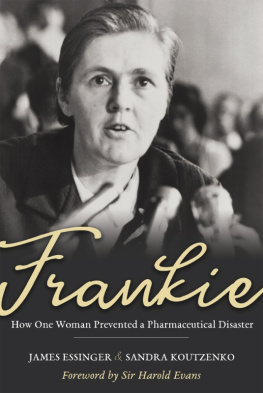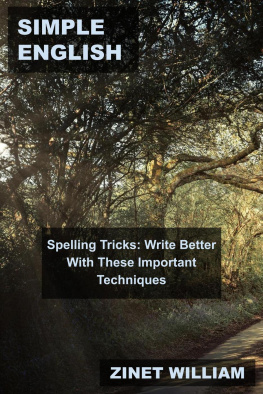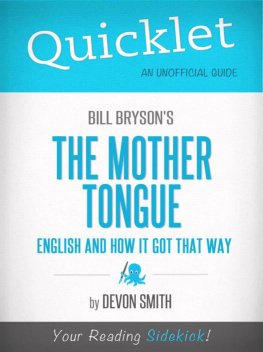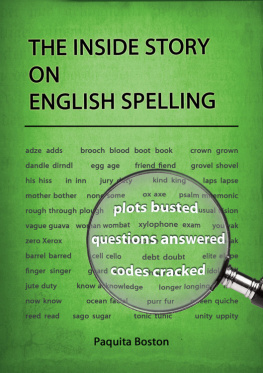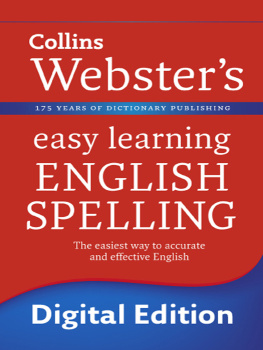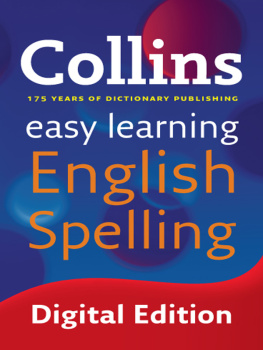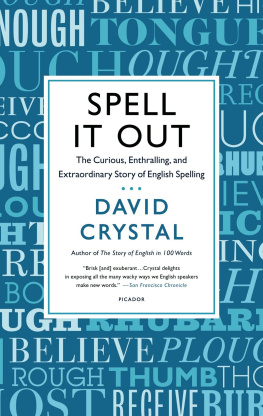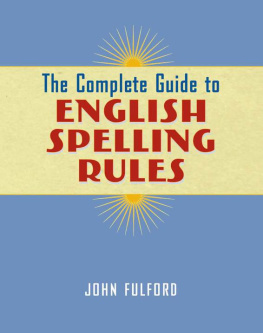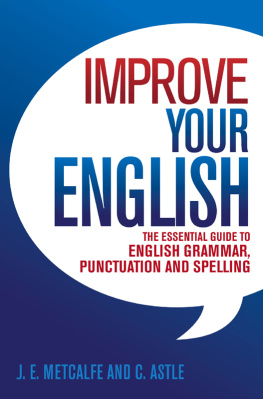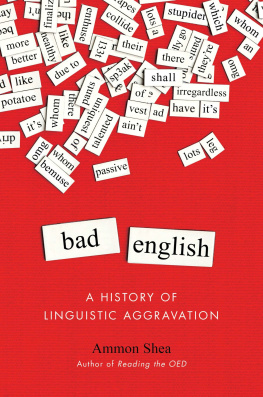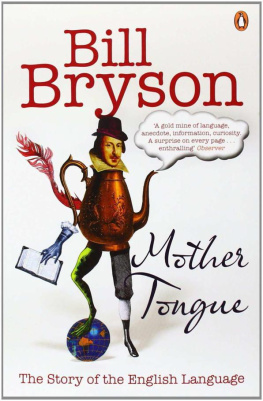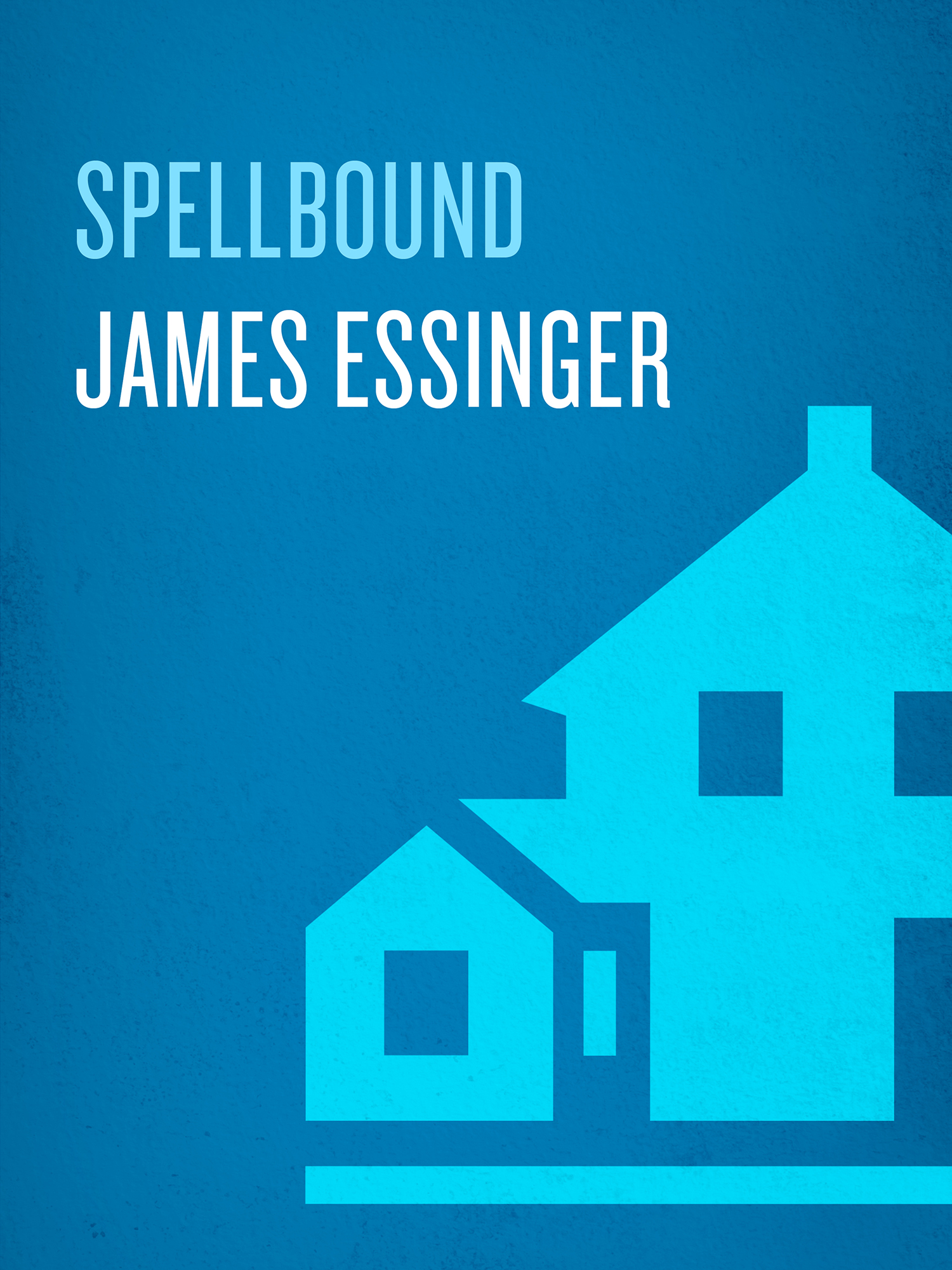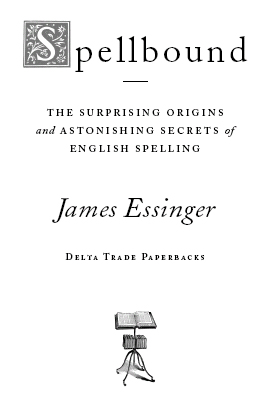Dedicated to the memory of my father,
TED ESSINGER,
who loved languages
Born in Chemnitz, Germany, May 23, 1922
Died in Leicester, England, August 5, 2005
As language was at its beginning merely oral, all words of necessary or common use were spoken before they were writtenThe powers of the letters, when they were applied to a new language, must have been vague and unsettled, and therefore different hands would exhibit the same sound by different combinations.
Dr. Samuel Johnson,
from the Preface to his Dictionary of the English Language (1755)
PREFACE
S pellbound?
Yes, because as users of the English language were utterly bound to the most outrageous, illogical, idiosyncratic spelling system in the world.
Outrageous and illogical? Yes, absolutely. But if you look deeper at the English spelling system and how it has developed since the English language first came into being more than 1,500 years ago, then the way English spelling works starts to make a whole lot more sense.
But why on earth should you be interested in finding out why and how English spelling has developed?
One reason is that the story of English spelling is a terrific detective story. As well as that, understanding how English spelling has become what it is will most likely improve your spelling. Why? Because it will make you more sympathetic to the way English is spelled.
And theres something else. Understanding how English spelling has evolvedand how the spelling system of English fits in with the story of writing as a wholewill bring you face-to-face with the enormously exciting cultural heritage you have as a user of English spelling. The English language itself is a glorious, infinitely useful, preposterously complex, endlessly fascinating tool that, like all languages, allows us to utilize to a wonderful extent one of the most basic by-products of being humanour expelled breath.
We can use this by-product to declare our love, call for help, recite a poem, discuss a work project with a colleague, ask for a bank loan, wish someone a happy birthday, and to do a myriadindeed, an infinite varietyof other things.
But heres the problem: The English language, like all languages, starts to fade the instant it has been spoken. Within a fraction of a second the spoken sounds we heard have expired. Like Roses lost lover Jack Dawson in the movie Titanic, spoken words can exist only in our memory or in the memories of the people who heard them spoken. Of course, its true that due to technological developments during the past 130 years or so, spoken words can be recorded as sound on a recording medium, but the invention of sound recording is an extremely recent one by the standards of a completely different kind of recording technology that has existed for, most likely, about 10,000 years.
That other kind of recording technology is writing.
If spoken language can be written down, it can be remembered for as long as the writing medium continues to exist. Writing not only preserves language. It alsoin a very real sensecheats death.

This book is about a particular kind of death-cheating: the writing down, or the spelling, of the English language.
One reason why any kind of spelling, and especially the spelling of English, can be annoying is that we need to conform so much with authoritythat is, with the accepted spelling standardwhen we write. Even people who hate conforming with authority have to conform when they write, at least if they want to make themselves understood.
True, there are occasional exceptions. Some prominent players in subculturesome writers, for example, or pop groupslike to show how rebellious they are by indulging in misspellings. On the other hand, they might simply be trying to attract attention and win fame.
In the 1970s the British pop group Slade had a breakthrough hit with a song entitled (and cheekily spelled) Cum on Feel the Noize. Slade became superstitious over the success of this song, and decided they needed to misspell the titles of all their songs if they wanted them to be successful. So the world was subsequently regaled with Mama Weer All Crazee Now, Coz I Luv You, Look Wot Yu Dun, and Gudby TJane. Fortunately, Slade came to their senses by the time they recorded and issued their most famous song, Merry Christmas Everybody, whichoutrageouslywas spelled in the accepted fashion and enjoyed so much success Slade probably didnt bother wondering whether it would have done even better had they spelled the title Meri Krismas Evrybodee.
There is something cheeky and subversive about misspellings, which is why many of us, and especially people who are young at heart or in body, like to use them in text messages or in e-mails. But no one really pretends these misspellings are anything other than precisely that: incorrectly written English. And even if the misspellings do somehow seem trendy and revolutionary, at least on first appearance, they really are nothing like as subversive as the accepted spellings, which have come into our writing system by a variety of ways that were, in their own day, trendy and outrageous.
There is plenty to say about English spelling, so lets get started. First, though, a few preliminary points.
Spellbound is designed to be a book for everyone, not only people with a professional (or masochistic) interest in English spelling. Because of this, I try to avoid using technical terms unless absolutely necessary. Such terms inevitably create a distance between a writer and reader that isnt particularly useful at the best of times, and especially not when one is writing about the technology of writing, which is first and foremost a communications technology and by its very nature designed to be accessible to the maximum number of users of a language.
Ive also found it helpful to stick to the following rules:
Modern English words quoted are enclosed in quotation marks as, for example, the word misspell here. This also applies to misspelled words, such as most of those written by my friend Nigel Molesworth, of whom more shortly.
Words from foreign languages are italicized. Ive also found it useful to employ italics for words quoted from Anglo-Saxon and Middle English. For English speakers, these languages are unfamiliar rather than foreign, but they are remote enough from modern English for some method of differentiation to be both useful and necessary.
When I refer to sounds I avoid making use of the International Phonetic Alphabet (IPA), which is for specialists. Instead, I tend to refer to the sound of a given letter as, for example, the a-sound or the b-sound. Where the sound needs to be identified with complete precision, I do this by referring to the sound in a particular context, such as the y-sound in year.
The Bibliography at the back of Spellbound mentions the published sources I found most useful. I heartily recommend all of them as fascinating reading if you want to continue your exploration of the story of English spelling, perhaps the most improbable yet also somehow one of the most lovable stories ever told.
INTRODUCTION
Be a scribe! Put it in your heart
that your name should exist like theirs!


